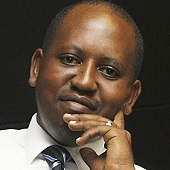From Employee to Self-Employed
Large organizations stifle creativity: Why we need parameters (not rules) to operate within (not under).
April 24, 2016
A few days ago – just about a little more than a month since leaving my job as editor of one of South Africa’s business dailies – I was confronted with an interesting question. It came by a way of a form that I had to fill out for my son before he could have his eye examination done.
Somewhere along the many bits of information required, they were also interested to know my employer. For a moment I hesitated, as I wrestled with a sudden realization that I was now actually my own employer.
With great abandon, I quickly scribbled “self-employed,” signed off the form and handed it over to the receptionist.
So, what’s the big deal? Indeed, this moment might actually seem like one of those trivial things considering the increasing amount of forms and official-ese that we must still deal with on a daily basis.
But, in my case, it actually gave me the opportunity to reflect on the significance of what had just transpired – mainly because I had never encountered it before. I had not expected to be confronted with this question so soon into my solo-preneurship journey.
I like to think that “self-employed” marks a very important transition in anyone’s career. Whatever the potential drawbacks, it also is a tacit acknowledgement of the great possibilities to be found in this age in which we live.
New Economy
In current parlance, self-employed is synonymous with freelancer or free-agent. The new economy has made freelancing the obvious choice for those that have the requisite skills to go it alone, or are brave enough to be truly creative, or have the sort of skills that also happen to be portable and in demand.
You probably have a skill that is among some of the most highly sought after in the new-age economy. But what are you doing about it?
The proliferation of technology has also made the world that much smaller, giving the creative types the opportunity to work independently and across borders.
And this is possible only because of the fundamental shifts in the relationship between employers and knowledge workers.
These are creative types, who by their very essence are free-spirited. What that means is that most of these people are intrinsically not favorably disposed to the strictures of rigidity. That’s what kills creativity, especially in big organizations.
Redefining the employer-employee relationship
Moreover, rigidity often means there is no other way — to think, build, lead and innovate. So is it any wonder then, that high performance organizations of our era are those that have found ways to “free” their people up, to see themselves as entrepreneurs or “self-employed” even though they might still be on a full time role with the company?
To be highly effective, these people, however, require a different set of parameters (not rules) to operate within (not under).
That 1 in 3 workers in the United States is now a freelancer, speaks volumes about the emerging fluidity of the employer-employee relationship.
Today’s generation of workers want to redefine this relationship to become more of partnership rather than of ownership. In the age of social media and personal branding, we are likely to see more and more people take the “self-employed” route.
Warren Bennis, a great scholar of organizational behavior and leadership, foresaw this era. In one of his many seminal articles, Bennis wrote that every age develops an organizational form appropriate to its genius.
His sentiment was echoed by Peter Drucker, who coined the term “knowledge worker” in the late 1950s.
Ours is “the first society in which ‘honest work’ does not mean a calloused hand,” Drucker noted. “This is far more than a social change. It is a change in the human condition.”
